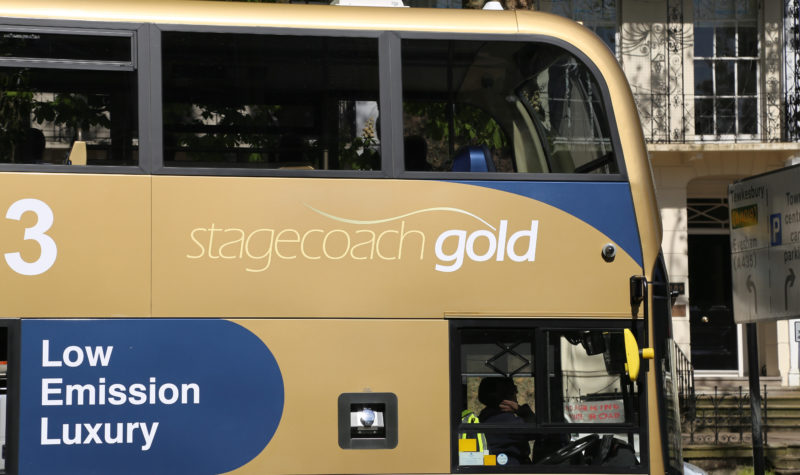Stagecoach Group – now is the time to jump aboard before this one starts its next journey

Stagecoach shares have been knocked for six by Covid, but the coming year could see the shares bounce back hard as the recovery takes hold.
Who would have thought that I would be profiling a company that runs public transport in these Covid-19 times?
However, just before this Wednesday I do think that the shares of this £400m local transport company are ready for a lift-up.
It is on Wednesday that the Perth-based Stagecoach Group (LON:SGC), founded by big charitable donors Sir Brian Souter and his sister Ann Gloag, will announce its interim results for the period to end-October.
One the biggest UK bus operators
The UK bus industry supports around 250,000 jobs, as well as thousands of others in bus manufacturing and support services. In total, there are around 32,000 buses in service in the UK.
Stagecoach, which started in business over 40 years ago, is today one of the biggest UK bus operators, running 8,500 buses and employing around 25,000 people across the country. In normal non-virus days around 3m people travelled on the group’s buses every day.
Over 66% of travellers use buses – in good times
Information from the group tells us that buses are key to the country’s transport system and carry around two-thirds of all passengers using public transport – which is around four times the number of people who use trains.
Public transport has a strong future as governments tackle the twin challenges of road congestion and climate change. The group’s core business is the local transport markets which have critical mass.
Stagecoach has a good team running the business
It has a strong management team with a proven track record in delivering good value, sustainable and innovative transport services.
Stagecoach has a balanced portfolio of deregulated and contracted bus businesses in the UK.
It operates on a network stretching from south-west England to the Highlands and Islands of Scotland, and includes major city bus operations in London, Liverpool, Newcastle, Hull, Manchester, Oxford, Sheffield and Cambridge.
As a matter of interest, in London the group operates around 13% of the scheduled bus network on behalf of Transport for London.
The group is also a major tram operator, running an 18-mile Supertram system in Sheffield.
Stagecoach operates the market-leading budget inter-city coach service megabus.com in around 90 locations in the UK.
Recognised nationally as a ‘value for money’ operator
According to independent research by Transport Focus, Stagecoach is rated higher than any other national bus operator on value for money.
The group offers heavily discounted multi-journey tickets, with easy online booking across the UK, as well as discounted tickets for students.
It is the market leader for budget inter-city coach travel. Its megabus.com services operate from around 90 locations in UK. Prices start from just £1 plus booking fee.
Its business megabus.com was launched in the UK in 2003 and revolutionised coach travel with its simple online booking system.
Recent years have seen quite a group reorganisation
The group has reorganised itself a great deal over the last few years and has cut back and divested itself of a lot of its international operations.
Way back in 2016 its total revenue was £3.87bn, upon which it made a £104.4m pre-tax profit, worth 27.7p in earnings per share.
In the year to 2 May 2020 its revenue was £1.42bn, generating just £40.6m profit, and earnings of 13.5p per share.
However, the current year sees analysts reflect the impact of the lockdowns on our economy – with forecasts of only £1.05bn revenues and a loss of £13.5m.
Look out for this Wednesday’s results
It is this Wednesday’s interim results that could help to rekindle further investor interest in the group’s shares.
The year to end-April 2022 could see £1.2bn of sales and pre-tax profits bouncing back higher than last year’s profits at just under £50m, worth 8.25p per share in earnings and with a 2.5p per share dividend.
At the current 73.5p those estimates for 2022 put the shares out on a prospective 8.9 times earnings and with a healthy yield.
Strong balance sheet
Now this is important – I must highlight that the group, valued at just £400m, had cash balances of £437.7m as at 7 October. Add that together with its undrawn by committed banking facilities of £406.4m, less £98.5m of train operating liabilities, and you will recognise its balance sheet strength.
Shares are now 80% lower than five years ago
Today its shares are trading at just 73.5p each, but just over five years ago they were trading at 405p. They have been down to 32.5p at their lowest this year as the virus impacted the market so heavily.
In fact, they were still as low as 38p just a month ago. But since then they have come up on professional buying lists again, as others start to realise the recovery potential.
A clue as to the group’s future prospects is based around help that the UK Government has promised local government on the continuation of practical transport systems for their areas.
Cost-cutting and future prospects
We shall hope that this Wednesday sees Martin Griffiths, the group’s CEO, describe the ongoing effect of all the cost-cutting and money-saving measures that his team has kicked in this year, together with his view of its future prospects.
As I have noted on several recent company profiles – forget about this year and the enveloping economic hassles and just look forward to operational recoveries in 2021 and thereafter.
Offering 36% upside or more
I see these shares as a very good runner for the next year and I suggest that patient investors should consider jumping aboard.
My target price for 2021 is 100p.
Comments (0)